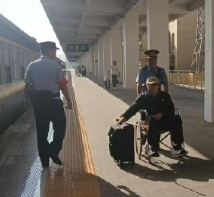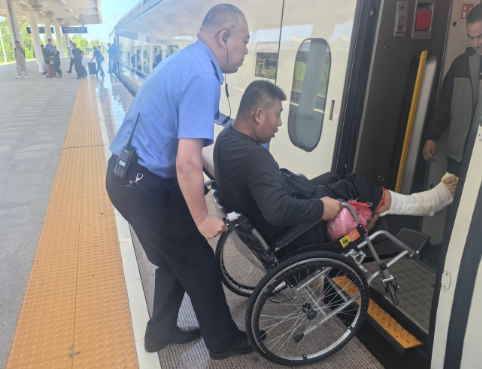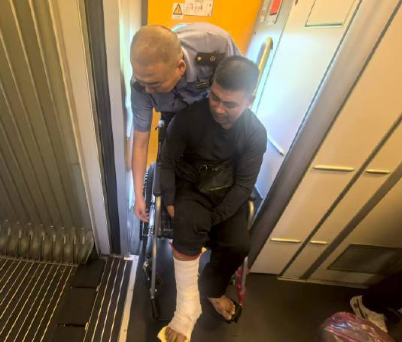The “Preparation Call” Four Hours in Advance
This journey began after purchasing the ticket. Mr. Zhang had pre-booked priority passenger services through the 12306 railway customer service hotline. To his surprise, four hours before departure, he received a confirmation call from the duty stationmaster at the high-speed rail station. The stationmaster meticulously inquired about his specific needs, train car number, and whether he required assistance with pick-up arrangements. “That call gave me my first peace of mind,” Mr. Zhang recalled. “I knew they were fully prepared.”
Seamless “Relay of Care”
On the day of travel, this meticulously planned relay commenced punctually. At the station entrance, staff equipped with walkie-talkies awaited him, swiftly guiding Mr. Zhang through the accessible green channel to the waiting area. Boarding proved the critical juncture. Crew members expertly deployed a portable ramp, bridging the gap between the platform and train door to ensure smooth, secure wheelchair access.
The train conductor had prearranged seating for Mr. Zhang in the spacious accessible seating area, where his wheelchair was securely fastened. Throughout the journey, attendants made multiple thoughtful visits, quietly inquiring if he needed assistance using the accessible restroom or requesting hot water. Their professional demeanor and perfectly balanced approach made Mr. Zhang feel both reassured and respected.
What bridged the gap was more than just a wheelchair
What moved Mr. Zhang most was the scene upon arrival. The destination station used a different train model than the departure station, resulting in a wider gap between the car and the platform. Just as he began to worry, the train conductor and ground crew acted without hesitation. They swiftly assessed the situation, working together to steadily lift the front wheels of his wheelchair while carefully instructing him, “Hold on tight, take it slow.” With strength and seamless coordination, they successfully “bridged” this physical barrier.
“They lifted more than just a wheelchair—they lifted the psychological burden of travel from my shoulders,” Mr. Zhang remarked, “In that moment, I didn't feel like a ‘trouble’ in their work, but a passenger truly respected and cared for.”
What bridged the gap was more than just a wheelchair
What moved Mr. Zhang most was the scene upon arrival. The destination station used a different train model than the departure station, resulting in a wider gap between the car and the platform. Just as he began to worry, the train conductor and ground crew acted without hesitation. They swiftly assessed the situation, working together to steadily lift the front wheels of his wheelchair while carefully instructing him, “Hold on tight, take it slow.” With strength and seamless coordination, they successfully “bridged” this physical barrier.
“They lifted more than just a wheelchair—they lifted the psychological burden of travel from my shoulders,” Mr. Zhang remarked, “In that moment, I didn't feel like a ‘trouble’ in their work, but a passenger truly respected and cared for.”
A Snapshot of Progress Toward a Truly “Barrier-Free” Society
In recent years, China's railways have continuously introduced key passenger service initiatives, including online reservations and station-to-train relay services, dedicated to bridging the “service soft gap” beyond physical infrastructure. The train conductor stated in an interview: This is our daily duty. Our greatest wish is for every passenger to arrive safely and comfortably at their destination."
Though Mr. Zhang's journey has ended, this warmth continues to spread. His story serves as a microcosm, reflecting how when societal care resonates with individual needs, even the most challenging obstacles can be overcome through kindness and professionalism—empowering everyone to travel freely.
Post time: Sep-05-2025







